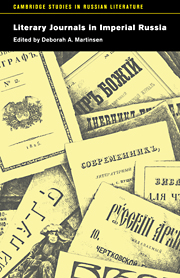Book contents
- Frontmatter
- Contents
- Notes on contributors
- Acknowledgements
- 1 Introduction
- PART I EIGHTEENTH CENTURY
- PART 2 EARLY NINETEENTH CENTURY
- PART 3 MID NINETEENTH CENTURY
- 5 Survey of Russian journals, 1840–1880
- 6 Belinsky the journalist and Russian literature
- 7 The Messenger of Europe
- 8 Dostoevsky's Diary of a Writer, journal of the 1870s
- PART 4 SILVER AGE
- List of titles of journals and almanacs
- Select bibliography
- Index
- CAMBRIDGE STUDIES IN RUSSIAN LITERATURE
7 - The Messenger of Europe
Published online by Cambridge University Press: 11 March 2010
- Frontmatter
- Contents
- Notes on contributors
- Acknowledgements
- 1 Introduction
- PART I EIGHTEENTH CENTURY
- PART 2 EARLY NINETEENTH CENTURY
- PART 3 MID NINETEENTH CENTURY
- 5 Survey of Russian journals, 1840–1880
- 6 Belinsky the journalist and Russian literature
- 7 The Messenger of Europe
- 8 Dostoevsky's Diary of a Writer, journal of the 1870s
- PART 4 SILVER AGE
- List of titles of journals and almanacs
- Select bibliography
- Index
- CAMBRIDGE STUDIES IN RUSSIAN LITERATURE
Summary
In 1866 M. M. Stasiulevich, formerly a professor of history at St. Petersburg University, founded The Messenger of Europe (Vestnik Evropy) as a triquarterly devoted to historical scholarship. The journal was to be serious, sober, devoid of politics and eschewing the mainstays of Russian journalistic polemics: belles-lettres and literary criticism. But within two years the journal's success encouraged Stasiulevich to include literature as well as politics and to publish The Messenger of Europe twelve times per year.
Its contributors included the leading literary figures of the day, both Russian and non-Russian. Its domestic survey set a standard for permissible criticism of the regime. It waged war with conservative journalism, first with Katkov's Moscow publications and then with Suvorin's in St. Petersburg. The journal survived until early 1918 and in its longevity and consistency (Stasiulevich remained as editor until 1908), The Messenger of Europe constituted the quintessential Russian thick journal of the second half of the nineteenth century.
The Messenger of Europe is correctly regarded as the locus of Russian liberalism, at least through the 1880s. Yet the memoir literature about it is inadequate, at times inaccurate, and even misleading. For instance, A. F. Koni, jurist and literary critic, who joined The Messenger of Europe circle in 1876, lumps A. N. Pypin with irregular and ancillary contributors. In fact for over two decades, Pypin was Stasiulevich's editorial assistant and the single most prolific contributor to the journal.
But Pypin is not the only figure connected with the journal to be slighted. L. A. Polonsky, who launched the domestic survey and began the journal's politicization in 1868, is accorded meager treatment in the memoir literature.
- Type
- Chapter
- Information
- Literary Journals in Imperial Russia , pp. 129 - 149Publisher: Cambridge University PressPrint publication year: 1998



